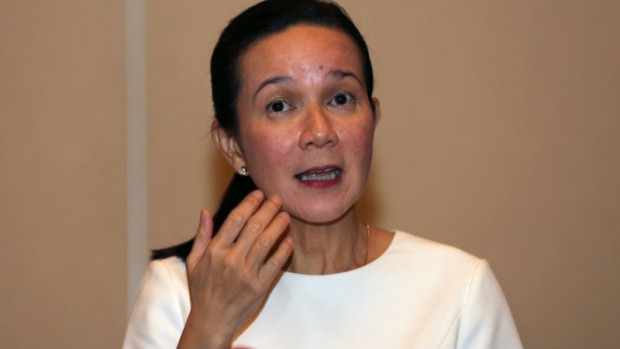IT LOOKS like a bleak Christmas for Sen. Grace Poe.
Commission on Elections (Comelec) Chair Andres Bautista said last night that in a meeting en banc, the poll body had voted on the motions for reconsideration (MRs) filed by Poe regarding her disqualification from the presidential race in May.
“It looks like it was denied,” Bautista told the Inquirer in a phone interview.
However, he declined to elaborate, saying he was set to call a press conference today to explain how the seven commissioners voted.
Asked if there were commissioners who changed their votes from rulings in the cases filed in the Comelec’s First and Second Divisions, Bautista said: “There were some who reversed their decisions.”
Comelec Commissioner Rowena Guanzon on Tuesday said that the poll body already voted on the MRs filed by Poe.
“We have voted on the motions for reconsideration,” Rowena told reporters. She said the promulgation of the decision would likely be made today, “certainly before Christmas.”
However, Guanzon refused to divulge the result of the Comelec en banc executive meeting.
“We cannot disclose our vote but the public should be assured that there is no delay. Many people have been asking why it’s taking so long,” she added, saying they had to carefully study the cases.
“Some commissioners are not yet done with their separate opinions so we have to wait for that,” she said.
Reversals
Asked if the poll body’s votes were too far from the Second and First Division decisions, Guanzon hinted that some commissioners reversed their earlier decisions.
“It can be different or can be the same but not all commissioners voted the same. And I think that every commissioner, including the chair, has arrived at a decision after careful study,” she said.
Poe filed two separate MRs after the First and Second Divisions of the poll body earlier ruled to disqualify her from the 2016 presidential race over her citizenship and residency.
On Dec 1, the Comelec’s Second Division voted 3-0 to disqualify Poe from the presidential race for her failure to meet citizenship and residency requirement. The petition was filed by lawyer Estrella Elamparo.
More than a week later, the poll body’s First Division voted 2-1 to cancel Poe’s certificate of candidacy for President after finding that she committed material misrepresentation when she claimed to be a natural-born citizen and has resided in the Philippines for at least 10 years—requirements explicitly mandated by the Constitution.
The First Division ruling covered three consolidated petitions filed by former Sen. Francisco Tatad, De La Salle University professor Antonio Contreras and former University of the East College of Law dean Amado Valdez.
A foundling, Poe’s biological parents remain unknown. She married an American, had taken US citizenship and resided in the United States, but returned and reacquired Philippine citizenship to run for high public office after her adoptive father, movie action star Fernando Poe Jr., who lost the 2004 presidential election to Gloria Macapaga-Arroyo, died.
Separate votes
Guanzon said the members of the en banc voted separately on the two cases.
“We did not consolidate because these are different cases in two divisions. So the MRs were also voted upon separately,” she said.
Guanzon said only Commissioner Christian Robert Lim inhibited himself from voting on the Second Division appeal because the petitioner in the case, Elamparo, was an associate in his former law firm.
“No one inhibited (in the First Division) because Commissioner Lim has no conflict of interest. So this is good because the parties can now go to the Supreme Court very soon. As we said, the SC is the final arbiter,” she added.
5 days to get TRO
Without particularly referring to the Poe case, Guanzon said any candidate had only five days after promulgation of a decision to secure a temporary restraining order (TRO) from the high tribunal.
“If they don’t meet the deadline to get a TRO, they will not be on the ballot. I’m not speaking about any particular candidate, that’s just the rule. It’s better for the cases to go up to the Supreme Court.”
“It’s really the SC and personally I think the sooner we release this decision, the better for parties and the better for the Filipino people,” she added.


